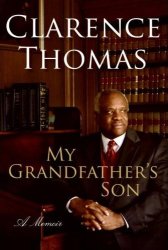My Grandfather's Son, Clarence Thomas
 As an associate justice of the Supreme Court of the United
States, Clarence Thomas sits in a position of tremendous
influence, one that ultimately issues binding opinions on the
very meaning of the oldest working Constitution in the world.
Many people assume that reaching such heights requires the head
start afforded by wealth and powerful connections. Justice
Thomas' remarkable story of his origin and rise demonstrates
that such is not necessarily the case. Sometimes those who come
from the most humble backgrounds can through hard work and
perseverance achieve what might normally be imagined impossible.
As an associate justice of the Supreme Court of the United
States, Clarence Thomas sits in a position of tremendous
influence, one that ultimately issues binding opinions on the
very meaning of the oldest working Constitution in the world.
Many people assume that reaching such heights requires the head
start afforded by wealth and powerful connections. Justice
Thomas' remarkable story of his origin and rise demonstrates
that such is not necessarily the case. Sometimes those who come
from the most humble backgrounds can through hard work and
perseverance achieve what might normally be imagined impossible.
Thomas opens his narrative with a statement that will be familiar to far too many of our fellow citizens: “I was nine years old when I first met my father.” We're introduced to the rest of his family in turn, including his brother and mother. Apparently unable to handle two young boys and a job that did not pay well on her own—her ex-husband and the father of her children did nothing to help—she sent young Clarence and his brother Myers to live with her parents, whom Thomas calls Aunt Tina (Christine being his grandmother's given name) and Daddy.
The move ultimately proved a good one for Thomas; under the supervision of his strict grandfather, he learned discipline and how to work hard, starting to help with the family business when in the fourth grade. Descriptions of his early interactions with the world beyond his family and in the educational system remind us that the color of one's skin had real meaning at one time in this country whose founding document declared that “all men are created equal”—particularly in the deep South.
Readers are taken on a tour through Thomas' past, able to see how the family of even meager means was able to put him on good footing by teaching him important principles that would serve him well and by proving equal to the task of getting him educated. Thomas' commentary give us insights into his thinking at various stages of his life, how he came to see the larger world around him and how he progressed from good student to angry black man, and from there to finding a productive outlet for his talent.
This narrative leads through Thomas' life course, taking us ultimately to the Senate confirmation hearings for his appointment to the U.S. Supreme Court. The episode is tremendously stressful for him and his family; we're able to see that irrespective of whatever principles one might have or how one has tried to apply them, getting to the top requires endurance—and sometimes endurance of ugly and miserable things. Achievement is never easy but achievement on one's own terms, where others cannot take the credit, is something even more.
Clarence Thomas has a remarkable story and has told it well in My Grandfather's Son.

